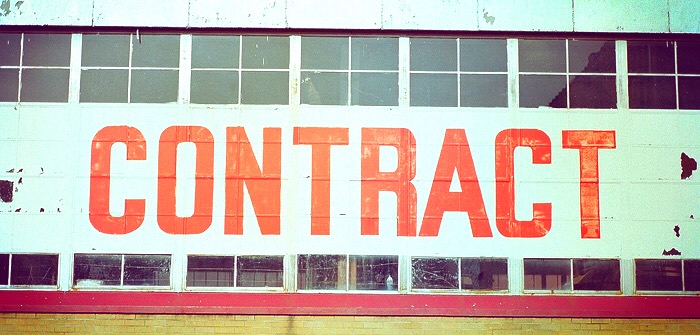The 11 Contracts Every Artist, Songwriter and Producer Should Know

The following comes from music industry attorney Steve Gordon (more on him below).
Although there is no truly “standard” agreement, many music business contracts begin as “form” agreements before the terms are negotiated.
Often, there are two versions of a form agreement: one that represents the best interests of creators, including artists, songwriters, and producers, and one that represents the best interests of the companies that do business with them, such as record labels, publishers, and managers.
These parties typically have adverse interests. For instance, while a record label will often attempt to secure rights in an artist’s sources of income beyond mere record sales, such as touring, merchandising and publishing, it is usually in the artist’s best interest to retain as much income from these secondary sources as possible. Other agreements, such as contracts between co-songwriters or band members, seek to delineate the rights and duties of similarly situated parties in order to avoid disputes that might otherwise arise.
In this upcoming series, I will review the form contracts you are most likely to encounter in your music career and provide commentary on each provision so that you can understand exactly what it is you are agreeing to.
My focus will be on the types of agreements typically offered to indie artists, songwriters and producers taking the step to the next level. By the time you are offered a deal with a major record label or publisher, you will be represented by a lawyer or manager who can help you navigate them.
In the first installment, I will guide you through a standard agreement between an artist and a manager, first from the point of view of the manager, then from the point of view of the artist. Future installments will tackle agreements such as:
2. Indie record deals
3. Synch licenses for original music
4. Co-writer agreements
5. Producer agreements for the licensing and sale of beats
6. Band agreements
7. Investment agreements
8. Agreement for production of music for TV ad campaign
9. Synch rep deals for artists, producers, and songwriters
10. Merchandising agreements; and
11. Performance agreements with clubs and promoters.
It is my hope that you will use this series as one tool to educate and prepare yourself for the negotiations that will help define your career.
***************
Steve Gordon is an entertainment attorney with over 20 years of experience in the entertainment industry, including 10 years as Director of Business Affairs for Sony Music, attorney at a law firm representing Atlantic and Elektra Records, and in-house music counsel for a Hollywood studio. He is the author of The Future of the Music Business (4th ed. 2015 Hal Leonard).
Steve Gordon gratefully acknowledges the assistance of Ryanne Perio and Anjana Puri in the preparation of this material. Ryanne Perio is a graduate of Columbia Law School and a former legal intern at Atlantic Records and SAG-AFTRA. She is currently an associate at Wilmer, Cutler, Pickering, Hale & Dorr, where she focuses on intellectual property litigation.
Anjana Puri is a lawyer pending admission to the New York bar. She currently works as an associate of Mr. Gordon. She received her JD from Benjamin N. Cardozo School of Law (2014) and received her B.A. in International Development Studies from UCLA.
Image by Steve Snodgrass, licensed under Creative Commons Attribution 2.0 Generic.
The post The 11 Contracts Every Artist, Songwriter and Producer Should Know appeared first on Digital Music News.
Source: Industry News
Leave a Reply
Want to join the discussion?Feel free to contribute!